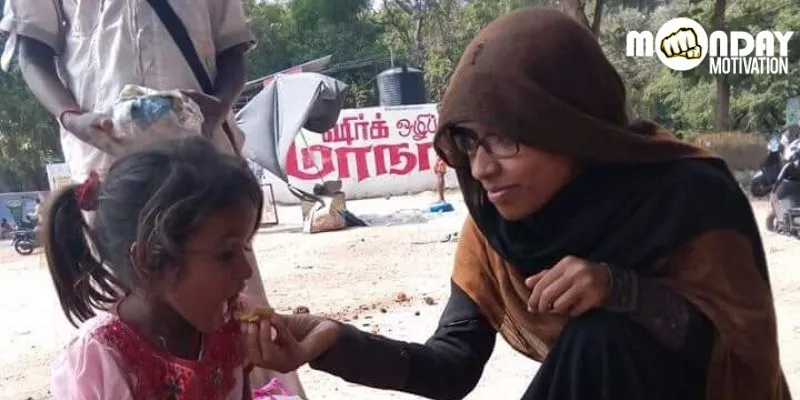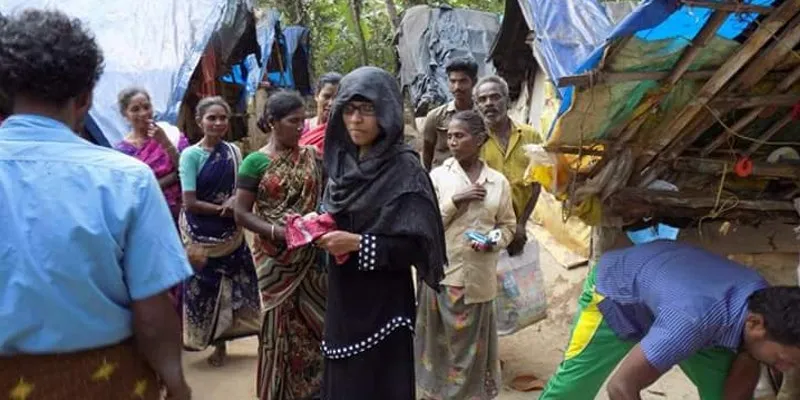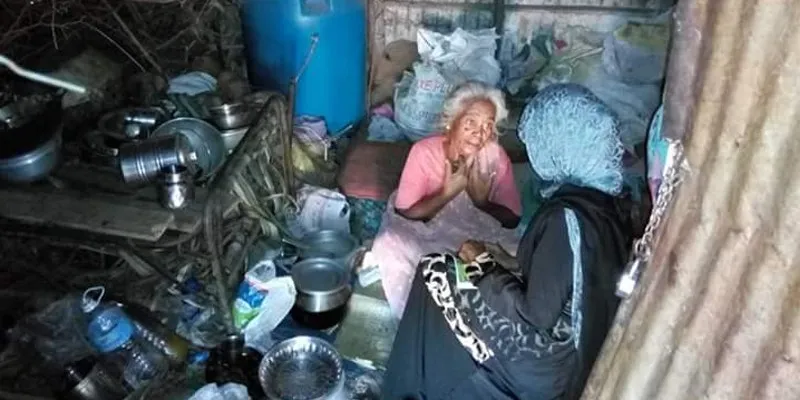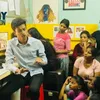Married at 15 and widowed at 20, this single mother is uplifting the lives of 200 families in Kerala
Sifiya Haneef was widowed at 20 with two children to take care of. But this did not deter her from pursuing higher education and uplifting the lives of people around her.
Sifiya Haneef got married at 15 when most girls of her age were making career choices, and indulging in fun and games. Just when she was getting accustomed to the responsibilities of managing a household and her new life, she lost her husband in a mishap.
“I did not know how to deal with my husband’s death. It felt like the entire world was crumbling around me. From anxiety over money to the stress of making decisions alone, I went through it all. I spent a very long time wondering how to bring up my children single-handedly,” Sifiya Haneef, now 31, tells Social Story.

Sifiya Haneef has taken it upon herself to bring social change.
In the midst of all the adversity, the one thing Sifiya held on to was her courage. Despite her parents urging her to stay with them or consider remarriage, she decided to pursue her education, aiming to break stereotypes associated with the life a widow, and work towards a better future.
Not only did Sifiya help herself and her family, she also eventually extended her efforts to alleviate the burden of the marginalised and underprivileged.
In 2015, she established Chithal, a charitable trust to help sick mothers, elderly folk, distressed widows, and cancer patients. Over the last six years, she has aided more than 200 families by providing them with food, clothing, and medicines.
Recently, Sifiya was conferred with the prestigious Neerja Bhanot Award for her noble service.
The turning point
Sifiya belongs to Vadakkencheery in Palakkad, a place characterised by an endless stretch of palm trees, green carpeted landscapes, and undulating hilly terrains. Her father had a hectic job in Saudi Arabia, and would rarely visit.
When Sifiya finished her Class 10 from Cherupushpam Girls High School, she was married despite not being ready. "Most girls in my village used to enter into a marital relationship early. So, though I was not very comfortable with the idea, I got myself to accept it,” she says.
Unfortunately, after five years, Sifiya lost her husband in an accident. With two children to take care of and no job at hand, she realised that the only way to get things back on track was to start over, finish her education, and find a job to support her sons.
“A few of my friends in Bengaluru assured me that they would help me find employment. But, when I got to the city, none of them came forward. Not knowing what to do, I spent almost two nights at the railway station. My younger son, who was just a year old then, was down with a fever. Just when I began losing all hope, an old lady, who was passing by, noticed my aggrieved state and offered some help. She took me home, fed me and my children, and provided a roof for a few days. If not for her generosity, I cannot imagine what would have happened to me,” Sifiya recollects.

Sifiya Haneef runs a charitable trust to help sick mothers, distressed widows, and cancer patients.
During the time, she managed to get a job at a call centre in Kerala. She started working and simultaneously started her Class 11 and 12 studies through correspondence. Sifiya went on to acquire multiple degrees and courses, including a bachelor’s in literature from Calicut University, a BEd from Ezhuthachan Training College, and an MSW and a diploma in public administration through distance education.
Through all this, Sifiya managed to secure funds not only for her education, but for the schooling of her children by taking up multiple jobs – from selling insurance policies and tutoring. She is currently teaching full-time at a primary school. However, she did not want to stop at achieving her goals only, and wanted to lend a hand to others.
Uplifting the lives of hundreds
At the end of 2013, Sifiya met several other widows in her village, and was reminded of all the suffering she had gone through. She wanted to do something to make their lives better. So, Sifiya started by contributing a portion of her salary to five families in need.
Later, she extended her efforts to many more – sick mothers, kids, elderly individuals, and cancer patients, among others. After two years, she decided to set up a charitable trust Chithal to continue her work.

Sifya Haneef lends an ear to an elderly women.
“Chithal means ‘termites’ in Malayalam. The word might sound like it has a negative connotation, but that is not the case. Just like how a termite shows up when you least expect it, I want to be there for people and eat all their worries away,” Sifiya explains.
Today, she leverages social media and crowdsourcing platforms like Milaap to gather funds from people to buy food, clothing, and medicines for the needy. So far, she has contributed to the wellbeing of more than 200 families.
(Edited by Saheli Sen Gupta)



![[Year in Review] From Greta Thunberg to Deepika Padukone, here are the top 10 newsmakers of 2019](https://images.yourstory.com/cs/5/4e0288202dda11e9b78a8b7eb69eb573/Untitleddesign-2019-12-26T175446-1577367133068.jpg?fm=png&auto=format&h=100&w=100&crop=entropy&fit=crop)





